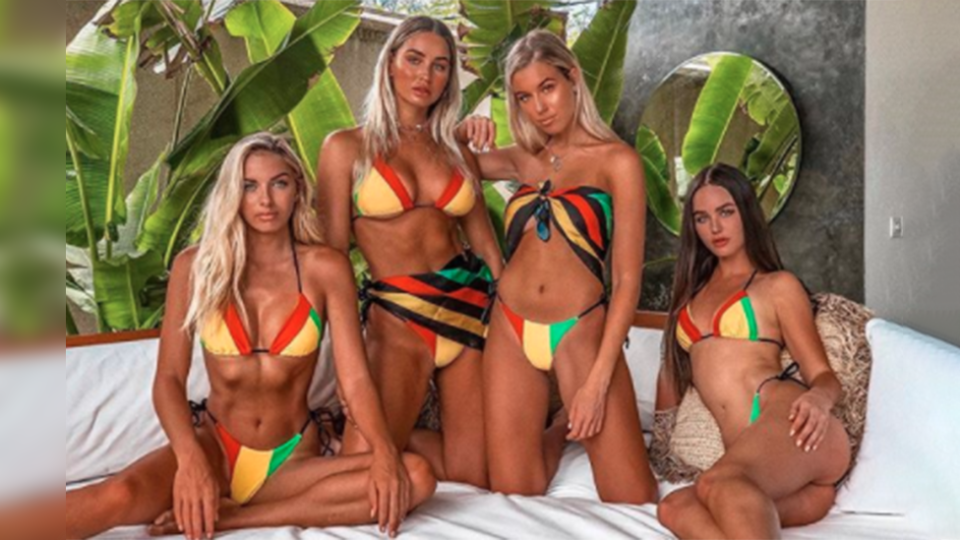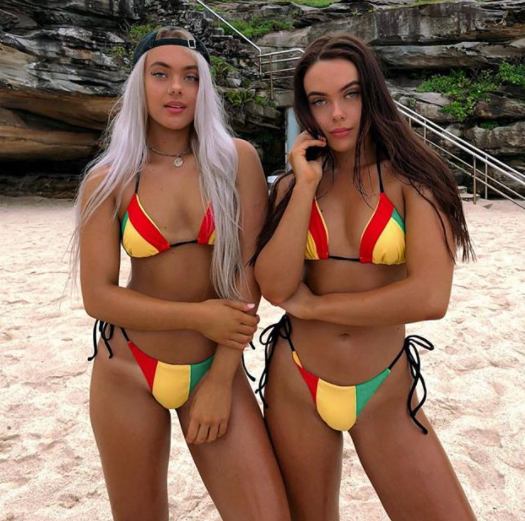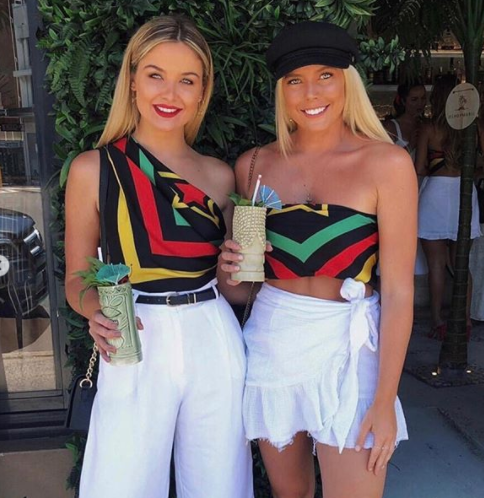Can you spot what's wrong with this bikini photo?
If you were on Instagram at the beginning of 2019 you may well have seen a brand called Shop Marli cropping up on your timeline.
Spruiked by Aussie influencers and reality stars from Jadé Tuncdoruk (Jade Tunchy) to Cass Wood of The Bachelor fame, the brand sold a range of bikinis, activewear items and accessories in a very familiar-looking pattern of red, yellow and green.

It was the clothing brand from Aussie influencer Madi Edwards, who said in a 2018 interview she was inspired by the ‘vibrant colour palette of island flowers and greenery’ when she chose the colours and came up with the name by combining her name with ‘a lot of different Islands’.
It was called the ‘Castaway Collection’, and it didn’t go over too well with some of Madi’s fans who couldn’t help but pick up on certain cultural connotations that smacked them across the face with about as much subtlety as, well, a brand called ‘Marli’ that used the national colours of the African nation Mali, which also happen to be the colours of the Rastafarian religion made famous by Jamaican singer Bob Marley to bedeck an almost exclusively white bevvy of Instagram models.
Fans instantly called out ‘ignorant’ branding

The brand was launched in December 2018, when one of the first glimpses of the red, green and yellow string bikinis sparked outrage from users.
“The fact that your brand has launched red, green, yellow, and black swimsuits and clothing - ignoring the significance it holds and the fact that it represents Rastafarian religion and culture is quite ignorant on your part,” a Jamaican-Canadian Instagram user wrote on the first image of the active-wear shared to Instagram.
“Those colours do not represent ‘island flowers and greenery’, they represent Jamaican Rastafarians. As an Australian, you are clearly unaware of the cultural significance it holds…”
Sam called the brand ‘cultural appropriation’, plain and simple.
“This is cultural appropriation in every sense of the word. Nowhere do you acknowledge any of this with your brand’s blatant un-creativity… I’m confused as to how gentrifying a religion from the Caribbean is something to be proud of.”
The furious response was echoed by others.
“Another company stealing another’s culture for profit, another company with no morals,” another wrote. “How MANY years after the abolition of slavery and y’all STILLLLLLL stealing from us????”
Other took issue with not only the use of the cultural colours and name, but the lack of diverse modelling of the swimsuit.
“No women of colour in any post under a brand called Mali with the colours of the flag everywhere...” one person wrote. There were, in fact, a range of models used on the page but the vast majority were indeed white Australian models.
“The link to Rastafarian culture is highly uncanny!” another pointed out. “On top of it there is no representation of women of colour! And no proper explanation of how the brand came about.”
They weren’t the only ones, dozens of other comments littered all the page’s photos.





All this before the brand had properly begun spruiking their items, and all ignored.
Shop Marli was actually a collaboration between Madi and now-defunct company inVue which was an agency that specialised in creating, launching, and growing brands and merchandise for influencers. inVue went out of business in April 2020 and weren’t able to be reached for comment.
Why are we talking about Shop Marli today?

So why is a now-defunct bikini brand from 2019 something we should be paying attention to today?
According to experts, the example of using a cultural symbol without acknowledging its origin or engaging with its meaning speaks volumes about what appropriation looks like, and why it’s so harmful.
So does the fact that all criticism was and continues to be ignored, and that there were no consequences.
“The fact that she’s obviously seen our comments and said absolutely nothing… proves the fact that white privilege is well alive in Australia!!” one person wrote in an Instagram comment at the time.
Shop Marli went on to sell out their Castaway Collection.
Madi Edwards never responded to criticism on the page and has continued undisturbed in her career, currently living and working in the US.
Neither Madi nor influencers involved responded to requests for comment for this story.
Power, politics and cultural copy-paste

Dr Shameem Black, of Australian National University’s Department of Gender, Media and Cultural Studies, says examples like Shop Marli, are most powerful because of the way they reflect on power dynamics between cultures, a power dynamic that came out in the above series of events.
“There may be a cultural practice that is trendy and everyone loves, but people from that part of the world may be subject to othering, or discrimination, or even outright violence,” she explains. “That kind of dissonance is what the term cultural appropriation is really trying to draw our attention to.”
University of Sydney cultural studies researcher, Dr Benjamin Nickl, says Marli presents as a good example of commercialising culture without engaging with it on a deeper level.
He contrasts it with Aussie brand Clothing the Gap, an Indigenous-run label that sells clothing inspired by Aboriginal culture and art to raise awareness and celebrate their culture.
“Marli does not seem to have a socio-cultural agenda, like Clothing the Gap,” Dr Nickl says. “This may be the difference between producing fashion with a sense of values and to simply appropriate for the sake of revenue.”
“Marli uses the [Mali] flag’s colours, plays on Bob Marley’s name and reggae and Rastafari culture to lift and copy-paste and build a lifestyle brand without any reference to the authentic context or origins,” he says.
A cultural mish-mash gone wrong

It’s something that the names of the brand’s pieces don’t help either – the ‘Margarita’ top, ‘Sangria’ sports bra, the ‘Rico’ scarf. A sudden nod to Latin America incongruous with the formerly African-inspired colours and brand name and, Dr Black says, a good indication that cultural understanding is at a minimum.
“It seems like an indiscriminate turn to different types of ‘other’ cultures that seem to be united mostly by the fact that they can be perceived as outside a kind of Western whiteness,” Dr Black points out.
And it would seem, without any acknowledgment of dissatisfaction from those cultures of origin.
“What would raise questions in this context is that these images seem to be referencing symbols of black power at a time when blackness is fraught across the world,” Dr Black says.
“It does raise a question about where the benefits of this are going.”
“It does seem by and large to be used to promote a particular kind of image of whiteness on a beach... images [that] seem to be escaping a lot of the complex politics of today.”
An opportunity for a conversation... if you’ll have it

The proof could very well be in the pudding, with not even the politics that erupted in the comment sections being acknowledged.
“Where cultural appropriation conversations do help us is if we use them as an opportunity to ask some deeper questions of culture and broader relationships of power,” Dr Black says.
Both Dr Black and Dr Nickl warn against the tendency to simply ‘cancel’ or shame people involved with brands like Marli swim, instead encouraging dialogue and discussions that further the visibility of the cultures that shoppers argued were being exploited.
As the irate onlookers pointed out, however, you can’t engage in a discussion with someone privileged enough to be able to simply ignore you.
Maybe it’s time for those of us in that position to turn around and listen.
Click here to sign up to our daily newsletter to get all the latest news and hacks. Or if you have a story tip, email us at lifestyle.tips@verizonmedia.com.

 Yahoo Lifestyle
Yahoo Lifestyle 



